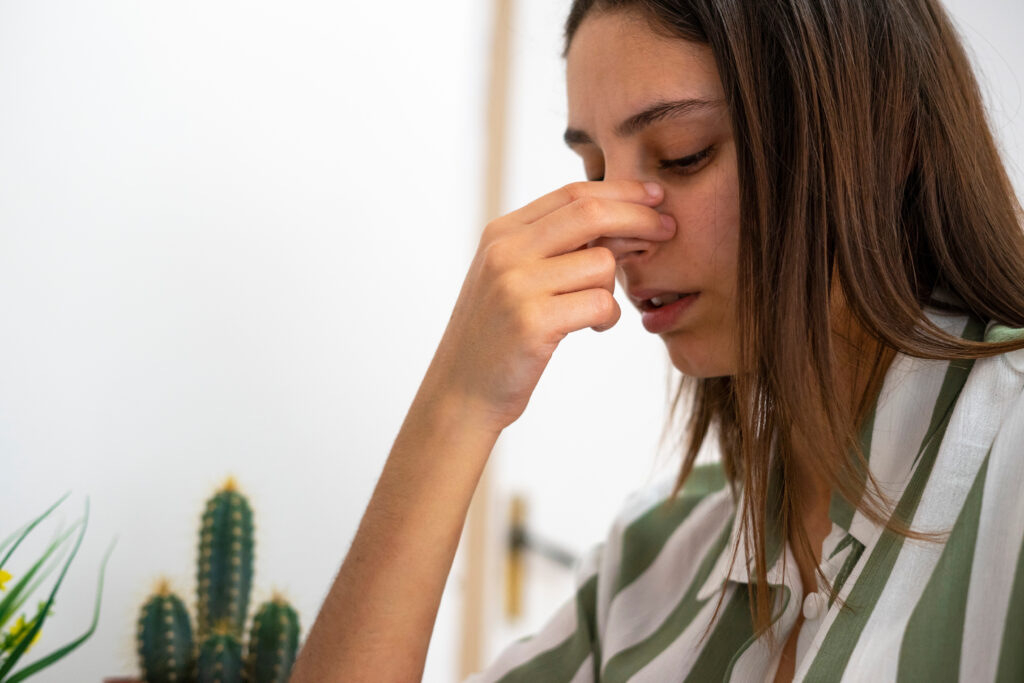
Nasal polyps are a common concern, with as many as 13 million people in the United States suffering from them. They are benign (non-cancerous) growths that can appear in the sinus and nasal passages and form from mucous membranes, the thin tissues that line the nasal and sinus cavities.
Nasal polyps tend to have tear-drop shapes and are distinguishable from normal nasal tissue. Because they usually grow on both sides of your nose, if you have a polyp on only one side, you want to ensure it is a polyp and not a cancerous growth.
Having nasal polyps is not life-threatening but can lower your quality of life. Breathing can become more difficult, and your senses of smell and taste can be affected. The good news is that there are treatment options available, both surgical and non-surgical, to help reduce the nasal polyp’s size or even remove it.
But who is at risk of getting nasal polyps? And how much does nasal polyp removal cost?
Causes of nasal polyps: Who is at risk of developing them?
Nasal polyps occur when the lining of your nose and sinuses change, which can happen due to chronic inflammation. Both allergies and infections can cause this inflammation, leading to small growths of fluid that then become polyps. Those who are more likely to develop nasal polyps include people who have:
- Asthma
- Chronic rhinosinusitis
- Aspirin-exacerbated respiratory disease
The symptoms can range from mild to severe and can include:
- Loss of or decreased sense of smell
- Headaches
- Chronic runny nose
- Stuffy nose
- Upper teeth pain
- Pressure throughout your sinuses
Without treatment, nasal polyps can get larger and block your nasal passages, which makes asthma attacks more frequent and repeated sinus infections more likely. They can even affect your sleeping.
Anyone who experiences symptoms that point to a nasal polyp should turn to a doctor. Your doctor will diagnose after asking about your symptoms and their frequency. They will also complete an examination with a nasal endoscope. Sometimes, your physician may also order a CT scan of your sinuses.
Treating nasal polyps: Considering non-surgical and surgical options
A saline nasal rinse is one of the first ways to treat nasal polyps. This rinse helps remove allergens and other irritants from your nose. To be most effective, the saline rinse should have a high volume of water with minimal pressure. If you must use a medical spray, a saline rinse beforehand can help your nasal tissues absorb the medication better.
Oral and spray steroids are two other options. Spray steroids can be effective, but they may not reach as deep into the tissues as necessary, requiring that you turn to oral steroids instead.
Your doctor might also recommend injections of a drug called dupilumab. These target a protein or cell to help prevent swelling. Because they are not steroids, some people respond better to dupilumab injections.
For severe cases and those that do not respond well to other treatments, surgery may be the only option. During the procedure, your doctor inserts a tube with a camera into your sinuses before using small tools to remove the polyp. They may also make incisions that run along your nasal passages into your sinuses to enlarge the space.
Nasal polyp surgical removal: Costs to expect
How much does nasal polyp removal cost? The surgical procedure for removing nasal polyps can cost between $8,000 and $13,000. The exact price will depend on a few factors, including how many nasal polyps your surgeon removes, how long the process takes, whether you need general anesthesia, and your insurance coverage.
It is important to consider the costs of some lifetime treatments, like injections of dupilumab. Over time, these can end up being more expensive than the cost of a single surgical procedure.
Living with nasal polyps
For some people, lifestyle changes can help make living with nasal polyps easier. Because surgery and even other treatments do not solve the underlying cause of the polyps, they commonly return.
Having your allergies and asthma symptoms in check can help prevent new ones from forming. You should also use saline sprays regularly to keep irritants away from your nasal passages.
Whether you want to go through a surgical procedure or not, it is possible to continue living with nasal polyps. Reach out to your doctor to learn more about how to get the help you need.
Resource links:
- “Nasal Polyps” via Asthma and Allergy Foundation of America
- “Nasal Polyps” via American Academy of Allergy Asthma & Immunology
- “What Is AERD?” via Allergy & Asthma Network
- “Functional Endoscopic Sinus Surgery of Nasal Polyposis” via National Institutes of Health
- “Real-World Costs of Nasal Polyp Surgery and Risk of Major Complications in the United States” via National Institutes of Health





